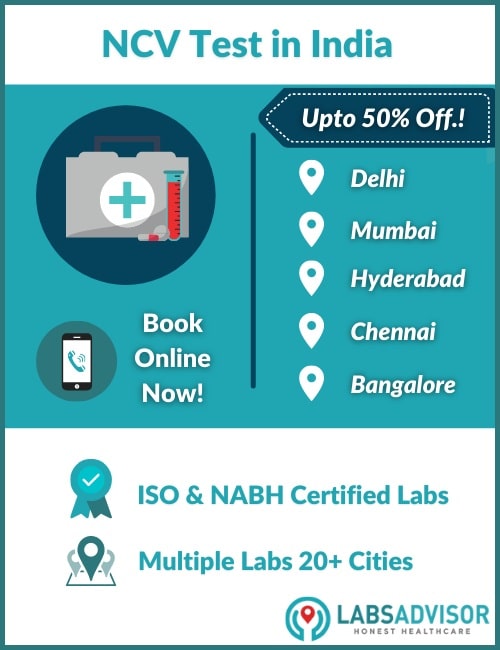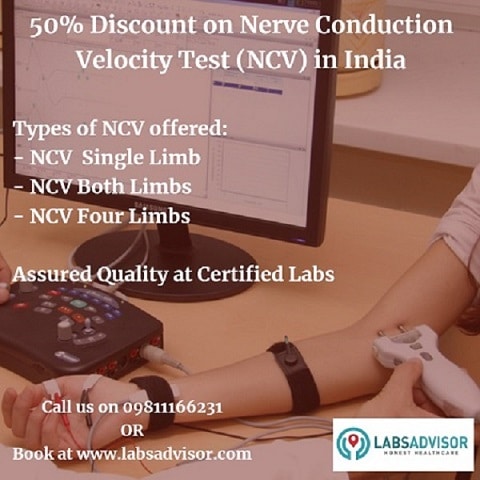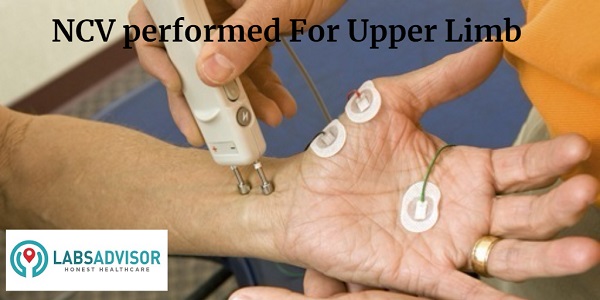
An NCV Test or the Nerve Conduction Velocity Test is an electrical test that is prescribed to determine how fast signals move through peripheral nerves (nerves outside the brain and spinal cord which help control our muscles and experience vital senses).
Book your NCV test at your local top-quality labs through us at up to 50% discount. The lowest Nerve Conduction Velocity test cost is ₹1275 only.
NCV Test in India Through LabsAdvisor
|
NCV Test Cost Near You in India and Lab Details
We offer the NCV test in over 20 Indian cities. Click on the link of your city below to choose a lab and make an online booking for home collection at a suitable time.
| City for NCV Test | Starting From |
| NCV Test Cost in Delhi | ₹1510 |
| NCV Test Cost in Gurgaon | ₹1500 |
| NCV Test Cost in Bangalore | ₹1190 |
| NCV Test Cost in Chennai | ₹2500 |
| NCV Test Cost in Other Different Cities | ₹1275 |
| NCV Both Limbs Cost in Different Cities | ₹1510 |
| NCV Four Limbs Cost in Different Cities | ₹2250 |
If your city is not listed in the table above, call us on +918061970525. We will get back to you with the NCV test price near your location.
Get the lowest NCV test price by calling us at
If you want us to call you back, click on the link below
The discounts on the NCV test price are available only to those who made the booking through LabsAdvisor.com. You will be asked to pay the actual NCV test cost if you do not carry the booking confirmation message sent by LabsAdvisor.com.

Frequently Asked Questions About NCV Test
What is an NCV Test?
An NCV Test or the Nerve Conduction Velocity Test is an electrical test that is prescribed to determine how fast signals move through peripheral nerves (nerves outside the brain and spinal cord which help control our muscles and experience vital senses).
In the case of healthy nerves, the electrical signals move through with greater strength and speed; whereas, in the case of damaged nerves, the process is comparatively weak and slower.
The NCV is also sometimes known as a Nerve Conduction Study Procedure and is helpful in the diagnosis of nerve damage or nerve dysfunction.
What is the purpose of the NCV test?
Symptoms of numbness, tingling, and/or burning sensations may prompt your physician to order a Nerve Conduction Velocity Test. The NCV test is usually performed to diagnose any nerve damage or dysfunctionality. This test allows the patient’s doctor to differentiate between a nerve injury and a nerve disorder.
Besides, this test can also be extremely helpful for the physician to single out between an injury to the nerve fiber and an injury to the myelin sheath (a covering that shields the nerve).
Being able to identify the real problem is extremely important to determine the future course of treatment.
How is an NCV test performed?
An NCV test is performed by a qualified Neurologist. During the process, flat patches called Surface Electrodes are placed on your skin, at intervals, over the nerves at various parts of your body. These patches are similar to the ones used during an ECG.
The electronic patches send out low-intensity electrical impulses that stimulate the concerned nerve. These impulses are in turn used to record the nerve’s electrical activity. The distance between electrodes and the time taken by electrical impulses to move between electrodes are used to assess the pace of the nerve signals.
In general, before an NCV test, you will be asked to do away with any kind of hairpins, clothing, jewelry, or any metal objects which may get in way of the procedure. Then, you will be asked to sit or lie down on a flat surface for the neurologist to locate the nerve(s) to be examined, the post to which, a surface electrode will be attached to your skin with the help of a special paste. The stimulating electrode will be placed at a known distance, away from the recording electrode.
The NCV test result can be seen on a monitor that displays electrical activity in the form of waves.

This entire procedure is simple and not painful in particular. Although, one may feel slight shock or discomfort. Once the procedure is complete, the patient may get back to his/her regular activities, unless advised otherwise by the doctor.
The NCV result is based on the diameter of the nerve and the degree of presence of the myelin sheath on the axon of the nerve. The Nerve Conduction Velocity normal value in infants is approximately half of that in adults.
It is an abnormal NCV test result if the response from the electrical current is slower than normal. This could be due to nerve damage, including:
- Axonopathy (Damage to the long portion of the nerve cell)
- Conduction Block (an impulse blockage along the nerve path)
- Demyelination (destruction and loss of the fatty insulation encircling the nerve cell)
It is recommended to consult a qualified neurologist for a further course of action in case of an abnormal result.
What are the required preparations for an NCV test?
No special preparation is required for an NCV procedure. However, make sure your normal body temperature is maintained, as low body temperature can slow down nerve conduction. If the weather is very cold, for example, you may be asked by your doctor to sit in a warm room for a few minutes before the test.
Generally, no fasting is required before the examination. It is always a good idea to inform your doctor of all the medication or supplements you have or are taking, before the examination. Also, inform your doctor in case you have a cardiac defibrillator or pacemaker.
Be sure to dress in comfortable clothes and avoid wearing jewelry, watches or anything metallic that may interfere with the procedure.
Right before the test, you will be explained in detail the procedure by your neurologist and you may ask any questions that you might have about the procedure.
Are there any side effects of an NCV test?
The Nerve Conduction test’s side effects might not be many. This procedure is very commonly performed in patients with diverse neurological disorders with rarely any side effects as these studies are usually very well tolerated.
However, like all other electronic devices, the surface patches too carry with them the risk of stray current leakage and may in very rare cases cause an electrical injury. Patients in intensive care settings are more prone to this rare side effect. Also, certain precautions need to be taken for patients with pacemakers and other similar cardiac devices.
Other topics you may be interested in:-
- Mammography Test Cost in India
- MCU Test Cost in India
- PET Scan Cost in Delhi for Cancer Screening
- Vitamin D Test Cost in India






